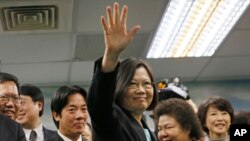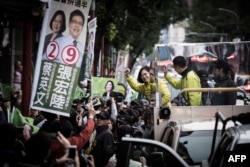With all the other issues on his plate, probably the last thing President Barack Obama will want to deal with in his final year in office is a possible return to crisis in Taiwan-China relations.
But after years of warming Taipei-Beijing ties that have been welcomed by Washington, this is a real prospect with the leader of Taiwan's independence-leaning Democratic Progressive Party (DPP) — an organization loathed by Beijing — looking set for victory in elections Saturday.
While Tsai Ing-wen has said she will not provoke China if elected president, the risk of worsening China-Taiwan ties is viewed with concern in Washington at a time when it is trying to tamp down tension over growing Chinese military power and assertive pursuit of territorial claims elsewhere in Asia.
On Wednesday, Obama's deputy national security adviser Ben Rhodes called on Taiwan and China to avoid an escalation of tension.
He said the United States was not taking sides in the poll and wanted Taiwan-China issues dealt with peacefully, regardless of who won.
"What we want to see is calm and dialogue," he said, adding that Washington would want to be supportive of this as it had been in the past.
"We will think through what are the best ways to support that effort when we have greater clarity about both the election results and how that's playing out," he said.
On Tuesday, the chief of the U.S. Navy, Admiral John Richardson, whose force is on the front line in the U.S. effort to maintain stability in Asia, agreed that a DPP win could bring heightened tension with China.
"We'll just have to see how it plays out," Richardson told Reuters. "It's going to be a factor in that theater for sure."
While Tsai's party has historically favored Taiwan's formal independence, and says it believes only Taiwan's people can decide its future, she has trodden carefully recently in discussing how she will engage China.
That was not the case when she visited the United States before Taiwan's 2012 election and the Obama administration was sufficiently alarmed for a senior U.S. official to air doubts about whether she was willing and able to maintain a stable relationship with China.
'Reliable partner'
Tsai visited the United States for 12 days in June and was at pains to ease those concerns, stressing support for the "status quo," and saying she would be a "reliable partner" for the United States with a "proactive diplomatic agenda for peace."
Beijing still considers Taiwan a renegade province to be retaken by force if necessary after nationalist forces fled there in 1949 at the end of China's civil war with the Communists that has never formally ended.
The United States backs a "one-China policy" and has no diplomatic ties with Taiwan, but is committed under its Taiwan Relations Act to ensuring the island can defend itself in the event of conflict. Obama reiterated this in a meeting with Chinese President Xi Jinping in September.
With strong backing for the commitment in the U.S. Congress, last month Obama angered Beijing when he authorized a $1.83 billion arms sale package for Taiwan.
Last Friday, Tsai said the DPP advocated "active diplomacy" and would seek greater cooperation with other countries. But she said Taiwan's diplomacy could not rely on China's goodwill, as it would then lose its "autonomy."
Patrick Cronin of Washington's Center for a New American Security think tank said the prospect of a DPP win had brought Taiwan back "as a serious foreign policy issue" for the United States at a time when Obama is already wrestling with multiple crises ranging from the Middle East to Ukraine to North Korea.
Tsai understood the stakes, but if her electorate perceived coercive pressure from China, "then change and instability may be accelerated," something that would necessitate a stepped up U.S. diplomatic effort, he said.
Cronin said this could be expected in the four-month interregnum after the elections, beginning with a scheduled visit of the DPP's prospective national security adviser, Joseph Wu, to Washington next week.
Cronin said he expected a cautious stance from Wu, while China was also likely, at least initially, to adopt a wait-and-see attitude toward a DPP government.
Bonnie Glaser of the Center for Strategic and International Studies said Washington could play an important role in trying to find common ground between the two sides, as it did when the DPP was last in power in the 2000s.
But she said the U.S. administration would find itself under enormous pressure from opponents in what is a U.S. election year to take a tough line with China should Beijing take a hard-line approach with Tsai.
Glaser said she did not think a DPP victory would lead to a "hot war" over Taiwan, "but I don't think it will be a simple handover with all things continuing as they have been for the past eight years."







